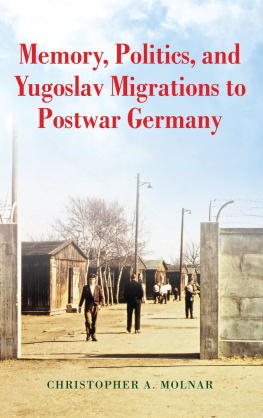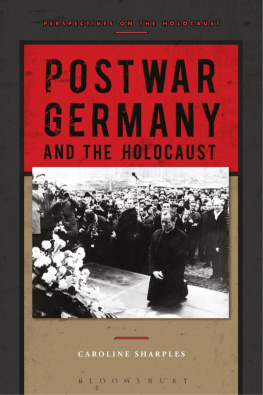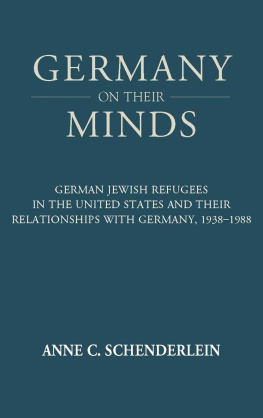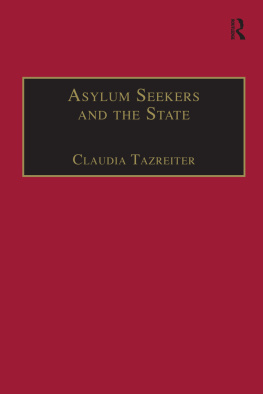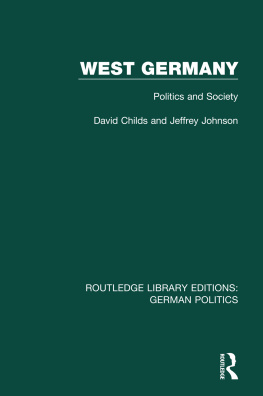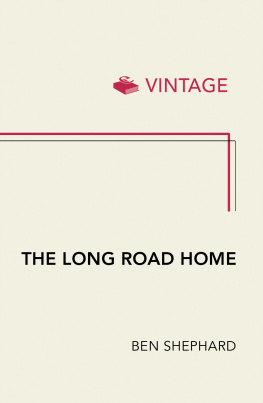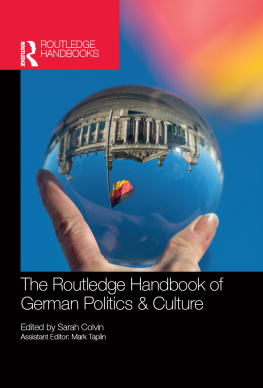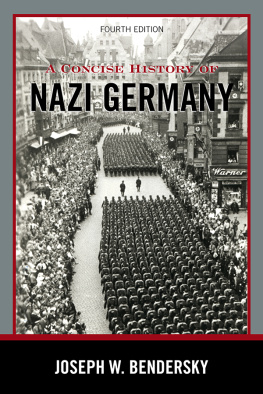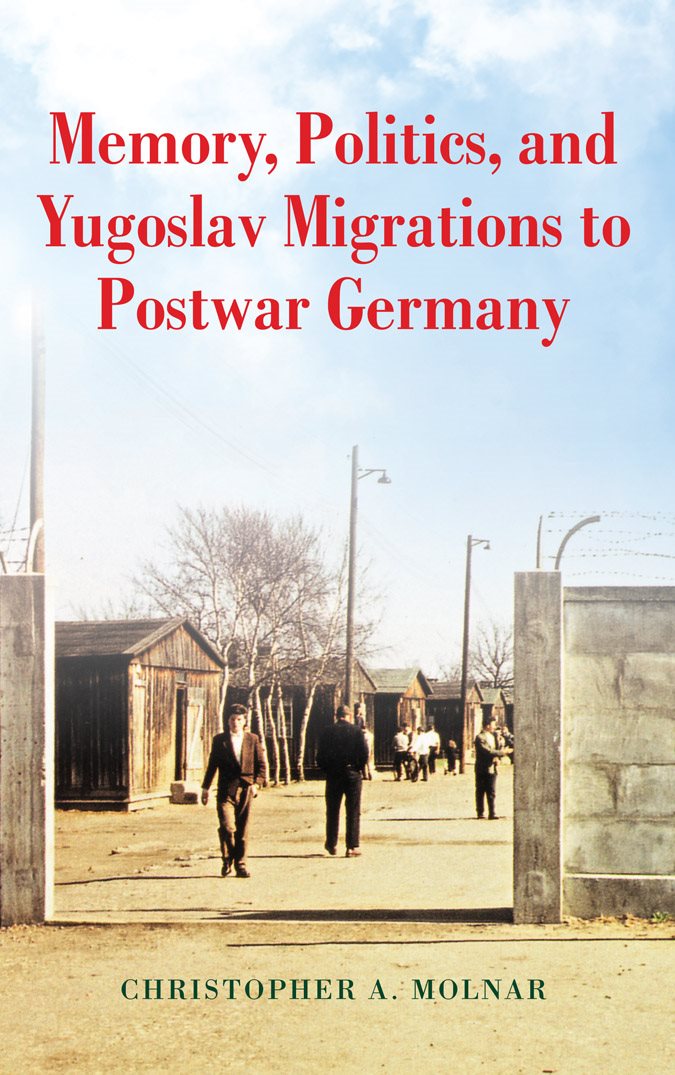Table of Contents
Guide
MEMORY, POLITICS, AND YUGOSLAV MIGRATIONS TO POSTWAR GERMANY
This book is a publication of
Indiana University Press
Office of Scholarly Publishing
Herman B Wells Library 350
1320 East 10th Street
Bloomington, Indiana 47405 USA
iupress.indiana.edu
2018 by Christopher A. Molnar
All rights reserved
No part of this book may be reproduced or utilized in any form or by any means, electronic or mechanical, including photocopying and recording, or by any information storage and retrieval system, without permission in writing from the publisher.
The paper used in this publication meets the minimum requirements of the American National Standard for Information SciencesPermanence of Paper for Printed Library Materials, ANSI Z39.48-1992.
Manufactured in the United States of America
Cataloging information is available from the Library of Congress.
ISBN 978-0-253-03771-8 (hardback)
ISBN 978-0-253-03772-5 (paperback)
ISBN 978-0-253-03775-6 (ebook)
1 2 3 4 5 23 22 21 20 19 18
For Beth, Isabella, and Joe
Contents
T HIS BOOK COULD not have been written without the support and generosity of many individuals and institutions, and it is a pleasure to thank them here. The research and writing of this book was supported by grants and fellowships from Indiana Universitys Department of History, the College of Arts and Sciences, the Office for the Vice President of International Affairs, the Graduate School, the Russian and East European Institute, and Western European Studies. The German Academic Exchange Service (DAAD) provided a year-long fellowship in Germany that allowed me to conduct the bulk of my archival research. The Department of History at the University of MichiganFlint has generously funded my research and writing through Wyatt Faculty Development Grants.
I conducted research for this book in more than ten German archives as well as wonderful research libraries in Munich and Berlin. In each of these locations, archivists and librarians provided invaluable guidance and pointed me toward useful sources. I especially want to thank the dedicated archivists and staff at my home archive, the Bayerisches Hauptstaatsarchiv. An early version of appeared as Imagining Yugoslavs: Migration and the Cold War in Postwar West Germany, Central European History 47, no. (2014): 13869, and I thank the publisher for permission to publish a revised version in this book. I also want to extend my appreciation to Indiana University Press. Gary Dunham showed an interest in this project at an early stage and Jennika Baines has been a responsive and supportive editor.
At Indiana University, where this project began, Mark Roseman was an excellent adviser and intellectual model, and he continues to be a friend and source of advice. He always pushed me to make this book address Germanys postwar history more broadly, and I hope he thinks that has now been accomplished. I also benefited enormously from the time and thoughtfulness that John Bodnar, Carl Ipsen, Padraic Kenney, and Julia Roos put into my work. Rob Schneider and Kon Dierks provided an intellectually stimulating environment at the American Historical Reviews Bloomington headquarters during my last two years of writing at Indiana University. My friends Brendan Fay, Patrick Gilner, Ramajana Hidi-Demirovi, Jim Seaver, and Ben Stellwagen helped make Bloomington an enjoyable place to pursue graduate study.
Work on this book continued at the University of MichiganFlint, which has been a great place to teach and write. I thank all my departmental colleaguesespecially John Ellis, Roy Hanashiro, Thomas Henthorn, and the late Bruce Rubinsteinfor warmly welcoming me into the history department and helping me quickly settle in and get to work. Although a teaching-focused institution, my department chair Roy Hanashiro always reminded me to keep writing and did whatever was possible to support my research. Conversations with Peggy Kahn helped me put my thoughts on the 2015 refugee crisis into coherent form. I am also inspired by the dedication and intelligence of so many of my students, who so often have too much on their plates, but still come to class with ideas and enthusiasm.
Friends, colleagues, and institutions beyond Bloomington and Flint provided invaluable support in bringing this project to fruition. Martin Geyer and Martin Baumann of Ludwig-Maximilian University in Munich took an interest in my research and supported my extended stay in that city. Rozita Dimova, Karolina Novinak Klker, and Karen Schnwlder were kind enough to meet to talk about my research when I had just embarked upon this study. Ulf Brunnbauer and Karolina Novinak Klker invited me to present the early results of my research at the Sdost-Institut in Regensburg and Heidi Hein-Kircher did the same at the Herder-Institut in Marburg. Mark Roseman, Elizabeth Heineman, and Glenn Penny invited me to take part in Midwest German History Workshops in Bloomington and Iowa City. I benefited greatly from each of these opportunities.
Numerous scholars have encouraged me to rethink and refine parts of this work through their comments and critiques at conferences and other academic gatherings. These include Rita Chin, Annika Frieberg, Stephen Gross, Steven Seegel, Quinn Slobodian, Mark Spicka, Lauren Stokes, Mate Toki, and Mirna Zaki. In Berlin, Bernd Robionek gave me a copy of his hard-to-find but excellent study of Croatian migrs and the Western Allies. Will Gray introduced me to the field of post-1945 German history during our brief overlap at Purdue University and has remained a friend and sounding board. Ari Sammartino made detailed comments at a critical time that changed the shape of the book. Brendan Fay, Michael Geyer, Patrick Gilner, Will Gray, and Bob Moeller all read chapters at various stages of the project and provided helpful feedback. The anonymous peer reviewers for Indiana University Press provided insightful comments that significantly improved the final product. All errors, of course, remain my own.
I could have never completed this book without the friends and family who provided encouragement, love, and support over the long duration of this project. My close-knit family has been a constant source of strength. My parents, Tom and Kathy Molnar, always insisted on the value of education, taught me a sense of curiosity about the world, visited in Europe on multiple occasions, and have helped in too many ways to enumerate. Hanging outpreferably at a lake house!with my siblings Andy, Amy, and Becca and their families has always been great fun and a much-needed break from the grind of teaching and writing. My funny, smart, and all-around amazing kids, Isabella and Joe, have grown up with this book and all things Germany. They bring joy into my world every day and help me keep life in perspective. My wife, Beth, is my best friend and has been a wonderful companion on every step of this long journey, from Gary, Indiana, to Central Europe, Bloomington, and now Michigan. Her love, support, and sacrifice made this book possible.
Y UGOSLAVIA WAS COMPOSED of many ethnic groups. In the postwar era, the largest groups were Serbs, Croats, Bosnian Muslims, Macedonians, Slovenians, and Montenegrins. When discussing immigrants from Yugoslavia in general terms and when my sources do not make clear the ethnicity of the immigrants they describe, I use the term Yugoslavs. German archival and print sources tend to refer to labor migrants from Yugoslavia simply as Yugoslavs. But sources almost always refer to postwar political migrs and refugees during the 1990s specifically as ethnic Croats, Serbs, Bosnians, or members of other ethnic groups. Whenever it is relevant and possible, I provide the ethnic identity of the immigrants under discussion. I have preferred Roma rather than the derogatory Gypsy, which is used herein only when it appears in sources or to highlight the language of historical actors. Unless otherwise noted, all translations from German are my own.
Next page
